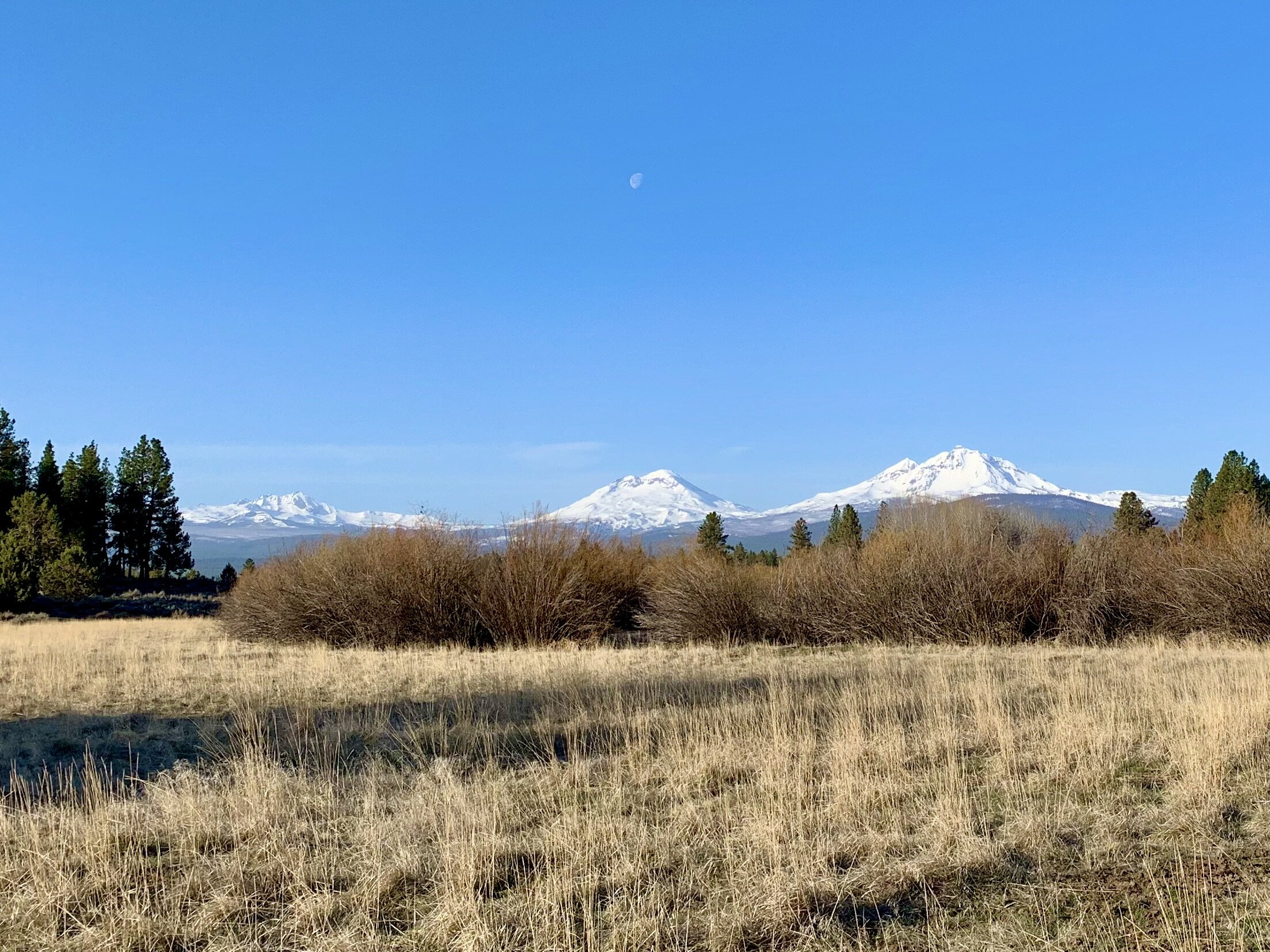My family’s plans got scrambled this spring – by accident, by death, and by the coronavirus.
On December 13th, we bought a house! How exciting! It is a big, sprawling 3-level view house, looking over Indian Ford Meadow and the surrounding mountains, three miles from Sisters, Oregon, a tourist town on the edge of the Cascade Range in Central Oregon. Drew is planning to work in Vancouver one more year before retiring here. I planned to move my folks into the lower level where they would have their own apartment, and they could spend their time looking out at the pines, the mountains, and the occasional deer and wild turkey. Now for the less-great news about the house: it was built in 1977 and hadn’t felt a hammer since. We got it for a relative steal, considering the Sisters real estate market, but there was a reason we got it for cheap; it needed major work. All three bathrooms needed to be demolished and rebuilt, all the lighting needed to be replaced, the kitchen needed a complete overhaul, and Drew insisted on removing the popcorn ceilings on the lower level. We budgeted the money from the amount we saved on the house and started calling contractors. We hoped to be done and ready to move in by mid-May, and we hoped to be able to move the folks in soon after. It would be our retirement home and my folks’ new old-folks home. I was looking forward to keeping a closer eye on Dad as his Parkinson’s symptoms were steadily progressing.
Here we are in December, falling in love with this meadow by our house.
Then Dad fell in the kitchen of their retirement home on February 8th. Just the day before, his doctor had prescribed a blood thinner to counteract the effects of a bout of atrial fibrillation. Unfortunately, that same blood thinner allowed a subdural hemorrhage from a head injury sustained in the fall to run rampant in his brain. We didn’t know it at the time, but as we waited in the hospital room for all the tests and CT scans, we were talking and joking with Dad in his last fully conscious hours. Hour after hour and then day after day, the damage took hold of more and more of his brain until at the end he lost everything but pain and anger. He died on March 20. On the day we arranged to have his body cremated, Willamette National Cemetery was allowing burial parties no larger than nine people. The next day, the Cemetery had closed to all burials. The virus’s spread and the rules were changing hourly.
Let’s play a game. What’s in this March 5th photo that is not in the April 12th photo below?
Then the CORONAVIRUS SCRAMBLE.
Drew came home from work at the fire station on March 23rd with a rigid urgency stoked by rumors spreading around the station that Oregon’s governor was going to close down all travel. That rumor was not true. Nonessential businesses were closing, but you can’t close state borders. That’s crazy. (Of course, what sounds crazy today may sound standard tomorrow.) But as the fire station saw more and more instances of untested (and poorly tested) critical breathing issues and looming protective clothing shortages, Drew was intent on getting my 88-year-old mom and me out of the city and now.
So we bugged out like in M*A*S*H. Drew had us packed and on the road before the day’s end. So three days after her husband passed away, and without any real family or community acknowledgement of that sad fact due to coronavirus restrictions, my mom gamely let my sister and us pack her apartment and move her to a new house in a new town. Although this sounds difficult (and it was and is difficult for her), it was a better choice than staying in the retirement home where she was living, as coronavirus rules there were soon so strict that residents were not allowed out of their apartments and lukewarm meals were being delivered to their doors. Sisters also provides a less-infected population for us to move around in so there is less chance for us to bring a bit of virus home with us along with the bread and toilet paper.
Then things started closing down fast. Art shows, including the Society of Washington Artists Spring Show that I was to help run, were canceled. Galleries closed. Salons closed. My usual pixie is more like a hippie shag. And I had to let the SWA Board know that since I now live in Sisters, Oregon, I would no longer be able to serve as president. In addition, due to the lack of salons and the temporary lack of mirrors in my bathroom, my constant bad hair days would really hamper my ability to be taken seriously as a leader.
What’s missing? Contrails! No air transportation, no contrails. (No chemtrails, am I right, sheeple? Safely smell that clean air!)
All this to say goodbye to Vancouver. I hope to be back for a real, in-person goodbye, but the coronavirus has taken away our ability to even plan that.
Our hello to Sisters is also on hold – there are no art guilds, churches or community organizations in which we can introduce ourselves during this shutdown, so we live here but it doesn’t yet feel like we LIVE here.
As we continue to renovate the house, ordering widgets and doodads online or picking them up in masks at Home Depot and bringing them back to whittle away at a never-shrinking to-do list, we wonder what it is like to be quarantined in a house with all its parts, doing puzzles or going through our Netflix lists, or maybe working in a studio (mine is still in bits and pieces).
Not a bad backyard to moon around in after a long day’s work hammering something.
I know that our problems are dinky in relation to medical workers on the hospital front lines, putting their lives on the line to do their jobs, and addition, grocery and other retail workers, forced to touch everybody’s stuff, sometimes with a little plastic between coughers, sometimes not. They keep saying we are in this together, but it seems like everyone is living their own separate, unique COVID-19 story. We will talk about this time the rest of our lives, and everybody’s story will be wildly different. What’s your story?




